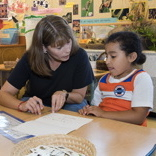“Do you have any questions?” I asked.
“Yeah,” Logan's mom replied. “So, how is Logan doing?”
What?! This is what I thought I had been explaining for the past 20 minutes! Taking care to be professional and polite, I walked Logan’s mom through our Head Start program’s processes for assessment and our methods for determining developmentally appropriate goals (which included her input). I discussed Logan’s areas of strength, and shared his individualized plan for further progress (which we prepare for every child) across different developmental areas. I had given her a lovely packet of painstakingly prepared materials, including information and activities to help her work with Logan at home. I explained how to do these activities. I even told her several cute anecdotes about Logan in the dramatic play area. Apparently, she hadn’t understood my beautifully crafted soliloquy. Someone's communication had taken a wrong turn.
I knew by the time I had finished our fall round of conferences that it was not her communication skills that had gone awry. Or Xhi Peng’s mom’s. Or Vinh’s dad’s. Or Susie’s grandmother’s. With translation, and on my own, I had managed to confound many parents and family members. They were confused about how their children were doing in school because I really wasn’t telling them—though I was telling plenty. I was reminded of the disembodied voice of Charlie Brown’s teacher whose mwwa mwwa mwwa mwaaaa mwa represents what the student is hearing. A lot of noise, but no substance.
After 21 years of teaching and conferring with parents, I thought I knew what I was doing. I had never confused parents to this level. So, what in the world had happened? Dusting off my wounded pride, I thought about our current parameters for meeting with family. Over the past few years, many new requirements have been added to our conferences. We have a long agenda to follow, with many points to cover. Although no one who knows me well would ever accuse me of following classroom mandates without argument, or with perfect fidelity, this is exactly what I had been doing in my parent conferences! I was stuck in a pattern of telling everything I was supposed to tell, in a certain order, rather than teaching parents about their child’s life at school. I am a teacher, not a teller. Time for some educational reform.
There is no one-size-fits-all curriculum, just as there is no ideal formula for conferring with parents. I cannot completely ignore what I am mandated to do in the classroom, nor can I throw out what I am mandated to do during parent conferences. What I can do, however, is to take what I know about good teaching and individualize my conferences for each parent, just as I individualize my curriculum for each child.
More Listening, Less Talking
To create true communication with parents, I need to be willing to make space for dialogue. I need to exchange information, rather than impart it. True, I need to keep in mind what I am mandated to share with parents, but this does not need to be delivered in a way that removes the parent from the equation. What parents really want to know is how their children are “doing” in school. Thus, my first task is to allow and encourage this question, before I begin to discuss anything that I have learned about their child. Just as I would never think of writing goals for children before assessing their learning, I should never just tell parents about their child before asking what they would like to know.
My next task is to define what “how is my child doing?” means to the parent—to do a little detective work early in the conference to figure out what the parent really wants to know. Are they wondering about how their child is interacting socially? (Is she bossy? Is he hitting peers?) Are they curious about how their child is doing academically? (How many letters does he know? Can she count to 10? Is he ready for kindergarten?) After this preliminary assessment is done, I can discuss what the parent needs to know, and weave in what I am mandated to share where it fits best. Because this will be a new procedure for me, I plan to make a list of the elements that Head Start requires, so I can keep track of them as we talk.
My hope is that in letting the parent lead, conferring will be meaningful and enriching for us both, allowing us to further understand one another and our mutual interest: the education of our little ones. Since our program has three rounds of conferences each year, I am looking forward to the opportunity I will soon have to try out my new conferring plan.






